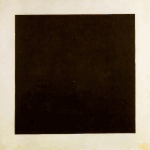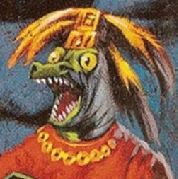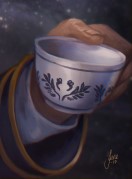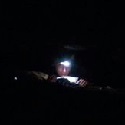|
Lichtenstein posted:In keeping with vaguely Thirty Years War themes, I've got this fluff idea of magic use actively pillaging the countryside - sucking the life out of soil, making the cattle fall to illness and scary things to appear in the dark forest. I've somehow already got images in my head of how this looks as it's happening. I dunno why, it's just really evocative somehow.
|
|
|
|

|
| # ? May 4, 2024 04:37 |
|
Building on what others have said, you could split magic into two types: Blood and Nature. Blood magic can be used anywhere and at any time; however, it sucks the life out of the caster and those nearby, in addition to the longer term negative consequences. Prolonged usage may even have the caster draw attention from otherworldly entities not known for their love of humanity. Nature magic is restricted to out of the way sites of power. Magic cast form these sites doesn't suck out much (or any?) life force, but is restricted to specific locales. Due to the sensitive nature of these sites as well as the general unease most people feel in them, it's not feasible to bring large bunches of troops. Only the mage and retinue can really set out on these kinds of treks. This gives you the benefit of allowing you to have more traditional D&D-esque encounters mixed in with your military campaign. This actually sounds pretty neat idea, i'm excited to see where you go with it.
|
|
|
|
Thanks a lot guys, those are the exact kind of "why the hell didn't I think of it immediately" answers I hoped to see!Siivola posted:You could divide the game into formal phases like I believe One Ring and Mouse Guard do. You could have a "campaign structure" of marching, preparing for battle, fighting, and finally regrouping, and only allow some limited number of actions to be performed per phase. Actually, injecting some Luke Crane-ish time structuring could work well for the pre-battle preparations. Do you want your soldiers to rest overnight, or fortify the camp and scout out enemy positions? Or rather blow all your time force marching to outmaneuver the opponent? This poo poo could work well with the slow, deliberate maneuvering of the era - and since I envision magic use as more of unhurried pre-battle rituals to slightly tweak the reality for your purposes, it could probably slot into that pretty well. Splicer posted:Go dark sun and suck it out of the soldiers too? There's the on going crushing of company morale and fighting effectiveness, and if there's wounded in the camp then you'll have to split your forces when the wizard casts or do it in camp and open yourself to "Stop casting, you're killing him!" ... And since the company's baggage train consists mostly of soldier's spouses and children, either morale or medical supplies go into freefall.  Seriously though, affecting all the dudes right there around you is the prime example of obvious poo poo that inexplicably refused to enter my head. Since the players will be managing a few abstracted resources (morale, supplies, reputation, gold, etc.), I could hit them in the pocket in more elaborate ways than "uuhh go buy $1000 worth of ingredients, kthxbai". Seriously though, affecting all the dudes right there around you is the prime example of obvious poo poo that inexplicably refused to enter my head. Since the players will be managing a few abstracted resources (morale, supplies, reputation, gold, etc.), I could hit them in the pocket in more elaborate ways than "uuhh go buy $1000 worth of ingredients, kthxbai".Sloppy Milkshake posted:Building on what others have said, you could split magic into two types: Blood and Nature. Blood magic can be used anywhere and at any time; however, it sucks the life out of the caster and those nearby, in addition to the longer term negative consequences. Prolonged usage may even have the caster draw attention from otherworldly entities not known for their love of humanity. Nature magic is restricted to out of the way sites of power. Magic cast form these sites doesn't suck out much (or any?) life force, but is restricted to specific locales. Due to the sensitive nature of these sites as well as the general unease most people feel in them, it's not feasible to bring large bunches of troops. Only the mage and retinue can really set out on these kinds of treks. This gives you the benefit of allowing you to have more traditional D&D-esque encounters mixed in with your military campaign. The setting idea is to spice the XVI century with a bit of low fantasy. In it, the Protestant movement is also pissed about the church establishment withholding the divine power from the common folk for what they deem entirely bullshit reasons. The Protestant witchcraft isn't really evil per se: its terrifying consequences are rather the effect of them being angry brats reaching for powers beyond their comprehension, as opposed to the established clergy that had some hundreds of years to figure poo poo out. I was slightly puzzled as how to do Catholic clergymen interestingly, but your post made me realise it'd be pretty to stick to actual priesthood: it's just kinda hard to attract divine attention and do Padre Pio poo poo, so you'd either have to work hard to grab ahold of an actual relic (good luck, being a lowly chaplain) or, assuming I go for the stricter timing structure, divert a big part of the unit (half of which are sellsword murderhobos that hate your heretic guts) to make for a decent mass prayer. quote:This actually sounds pretty neat idea, i'm excited to see where you go with it. Thanks for the kind words! I'll sure share it as soon as I join everything into a barely-playtestable coherence. The idea was born out of the reflection on how loving weird D&D combat is, being this bastard of wargaming that's so stuck up in its internal logic it has little to no bearing in reality. You know, weird poo poo like using rules written for galleon combat for personal combat etc. Also that so much time and effort is spend on supposedly tactical combat, that's really mostly regurgitating the same abilities and spells you've unlocked on level-ups. So my idea was to, in a way, go back to the pre-RPG roots, crib some ideas from modern, sleek, eurogame-influenced wargames and marry them to modern narrative low-to-medium crunch rpging. And isn't it just cheerful adventure and camaraderie? (Viggo Mortensten and the chair dude are PCs).
|
|
|
|
I also wanted to jump in and say that this idea rocks. I mentioned it to a friend in passing (he's a huge history nerd, the Thirty Years War being of particular interest to him) and he was immediately like "When can we play this game?" He also mentioned that apparently during the Thirty Years War there was some popular narrative to the effect that they were basically living in the end times and both sides saw themselves as fighting for God against the forces of Satan. Also, alchemy, esoteric secret societies, you name it. It's a great setting for a really dark twist on traditional fantasy.
|
|
|
|
You guys gave me some great advice and I've got the exact kind of question that needs another pair of eyes. Basically, a mechanical idea cropped up out of purely aesthetic reasons and I'm not sure if it would represent something or would just be bonkers gamey thing I should probably forget. Context: - I'm going with card-based resolution system, where, in general, card value relates to success chance, and suit relates to triggering little boons and twists. The "trump" suits depend on which stat is being involved. - Morale is a global point pool for each side. When it goes to zero, your forces rout, you gain and lose points depending on what's happening and you can burn the points for various little buffs (Úlan!) - There's a naming convention for units, to keep things quick and easy. It's basically leader + type, so Aragorn's Pistoliers, Gandalf's Pike, etc. So, I was toying with a deck of cards to get a general feel of how the probabilities work out and it struck me the cards are kinda shaped like an early modern line/column. So - purely because it looks kinda cool - I thought one could use the cards to indicate positions on the battlefield - just lay them down and mark with a sticky note or whatever (shouldn't get too messy given the scale). With that done, each unit would effectively be assigned a random die roll, which just begs to be used mechanically somehow! For example, one could spend a morale point to flip the unit face-up, to guarantee a "roll" they know would be favorable, in a surge of esprit de corps. If a unit has a poo poo card, you'd mostly ignore it, just happy it's gone from the deck. I guess it would represent unit's fitness on that particular day, and there could be some camp actions to ensure the men are drilled, rather than drunk. Basically, I'm asking if I make any sense, because this is a random thought I have trouble judging myself. Sorry for rambling.
|
|
|
|
I'm sure I've asked this exact same thing before, but when laying out a PHB-type doc, is it better to have Class info at the beginning and then mechanics/terminology at the back?
|
|
|
|
P.d0t posted:I'm sure I've asked this exact same thing before, but when laying out a PHB-type doc, is it better to have Class info at the beginning and then mechanics/terminology at the back? I would say explain things as they come up, at least briefly. When I'm making a character, I want to be able to do it progressing through the book as I go. Having to flip back and forth is a pain in the rear end, and getting to the end to find out how mechanics work and deciding to redo a lot of character stuff is kind of a bummer too (had to do this with my first Dark Eye character). I'd say take a stab at what you think is best, and get someone else to build a character for it while you watch. Pay attention to their questions, how much flipping they need to do, what doesn't "click" with them, etc. Also, Lichtenstein, your game sounds cool as hell.
|
|
|
|
P.d0t posted:I'm sure I've asked this exact same thing before, but when laying out a PHB-type doc, is it better to have Class info at the beginning and then mechanics/terminology at the back? I've recently been reading through the Marvel Heroic Roleplaying Game, and one cool thing they do is extensive sidebars - essentially every time a rule elsewhere in the book is mentioned there's a sidebar giving a quick summary of the rule and a page reference. I could see that working well to solve this problem.
|
|
|
|
Okay, so my new game has got to the point where the spell lists are finished, so some goon feedback would be welcomed! There are three caster classes - Cleric (mostly buffs), Wizard (mostly blasty stuff) and Elf (mostly controllers). Each class has 20 spells total. Are any of them under/overpowered, pointless, or duplicating another? Link to PDF here. Quick summary and explanation of terms: the game (designed for one-shot adventures) is a development of TAAC, which itself was a roll-under hack of B/X. There are only three character 'tiers' (replacing levels); Explorer is equivalent to L2, Adventurer to L6, and Hero to L10. Most spells can be cast at all three tiers with increasing effectiveness. WIL is Willpower, replacing CHA. PER is Perception, replacing WIS. A Check means a PC has to roll equal to or less than the relevant stat to succeed; a Save is the stat -4. Combat is much the same as TAAC - either you're in Melee, or you're not, in which case you're in Support. An Interception allows a PC in Melee to try to block an attack on a character in Support. A Blitz Attack is a guaranteed-hit Melee attack, with the risk of taking damage in return. I think everything else is explained in the PDF. Any thoughts?
|
|
|
|
Payndz posted:Okay, so my new game has got to the point where the spell lists are finished, so some goon feedback would be welcomed! There are three caster classes - Cleric (mostly buffs), Wizard (mostly blasty stuff) and Elf (mostly controllers). Each class has 20 spells total. Are any of them under/overpowered, pointless, or duplicating another? I posted in the retroclone thread regarding this.
|
|
|
|
So, my game of mercenarial arts (working title: Canes Belli) is coming up rather nicely. I've done quite a bit of work on mechanics, card-based resolution system, troop classification (it's cool to be able to choose between gendarmes and demi-lancers, but only as long as you can tell at glance they're just some sort of charge cavalry flavors) and assorted crap. The details are still slightly morphing as various interlocking systems are being put into place, so it's perhaps a bit too early to write at length about it. I've kept warming up to representing units as cards - there's some nice things you can do with them physically, for example overlap one over another for easy visual cue that, say, the muskets are hiding within a pike square. Or, touching the enemy card on the short side to indicate they're being flanked. Neat little indicators like that. One of major things I'm working on right now is a semi-abstract, large scale grid for mass combat maneuvering - think Last Stand rather than D&D. While in principle I don't need much more detailed positioning than, for example, 13th Age, I feel that the nature of large scale open terrain makes the pure theater of mind approach somewhat cumbersome. Basically, I want to give some bare minimum codification to make it clear whether that beer coaster GM put there as a forest is one or two moves away. I'm super cautious about not turning it into a mini-game in itself, but rather hopefully making it just a way to express some information about distances when pure narration becomes cumbersome and/or unclear. Considering the rather narrow scope of the game I felt embolded to go with strong archetypes for PCs, akin to *World playbooks. Early picks lined up rather nicely to go for the two archetypes per main stat approach, and I'm pretty much almost there. So far I'm going with: Captain - a character focused on leadership and command. While not an Influence archetype mostly due to wishing for an even split, gently caress this, he doesn't have to be prince charming, but rather a determined leader that won't fold under pressure. Witch - creepy Protestant spellcaster, knowledgeable in all sorts of arcane matters decent people shouldn't think about. Chronicler - character making sure no past deeds and sacrifices of the company become forgotten, for both reputation and morale reasons. Not being a murderhobo makes him useful as an emissary to boot. A sort of tribute to game's major literary inspiration. Chaplain - your friendly neighborhood (Catholic) cleric. Less of an arcanist than the Witch, but more of a charismatic/support dude. Cavalier - sad middle-aged dude bemoaning there's no place for chivalry anymore. Expert on all things equine. ??? - ... And I'm missing one more martial archetype to round things out and not having any strong ideas. Who would you guys like to play as? Also, I really don't have an idea for how to name the military science guy. * Small, yellow and hard.
|
|
|
|
While thinking about the skill mechanic for the next iteration of Some Heartbreaker I did a thing.
|
|
|
|
Lichtenstein posted:Also, I really don't have an idea for how to name the military science guy. Tactician? The Strategist? The Academic, since most of these guys were from military school or academies but that would separate the guys who went there for lessons in leading and honor and those who went to be smarter officer cadre. For the ???, I'd probably suggest the Skirmisher, who moves quickly and ruthlessly to either fill holes or gaps in their own lines, harassing enemy lines, exploits gaps in the enemy's defenses. They tend to operate in by their lonesome or in small groups so as to be unrewarding targets for volleys and artillery, since killing them wastes ammunition and reloading time that could be used against larger enemies. It separates them from the Cavalier by being footsoldiers.
|
|
|
|
Paolomania posted:While thinking about the skill mechanic for the next iteration of Some Heartbreaker I did a thing. So uhhh, whatcha gonna do with that?
|
|
|
|
Paolomania posted:While thinking about the skill mechanic for the next iteration of Some Heartbreaker I did a thing. P = (x^n - (x-1)^n) / f^n Only works for a single maximum die and for pools of identical dice. For cumulative probability, e.g. rolling against a TN y, you can chain the numerators together and remove the middle terms, since they cancel: (x^n - (x-1)^n) + ((x-1)^n - (x-2)^n) = (x^n - (x-2)^n) The last term in the order should be (y-1), since we're ignoring anything less than y. We can simplify further since we're working from the top down (x=f): (f^n) - (y-1)^n) Lastly we divide by f^n as above, letting us simplify even further: P = 1 - ((y-1)/f)^n Here's a more visual way of looking at this: pre:|1 2 3 1|1 2 3 2|2 2 3 3|3 3 3 Let me know if I've made a mistake somewhere. UnCO3 fucked around with this message at 16:34 on Mar 29, 2015 |
|
|
|
Okay, so this is probably a foolish venture, but at the very least the knowledge I gain should be useful. I've been playing way too much Hyrule Warriors for a while now, and I got it into my head that it'd be cool to see a game set in the Imprisoning War (LttP) or the 7 years without the hero (OoT), focusing on a motley crew of talented and powerful warriors struggling to slow/stop Ganondorf's advance without access to the Hero of Time nor the Master Sword. The main thing I'm wondering about is, how would one model puzzles? Because it's not Zelda without block-shoving puzzles at some point. Are there any systems that have had interesting or fun implementations of puzzles in their gameplay? Would this be the sort of thing where you just shove a randomly-generated Sudoku puzzle at the players and give them parts of the answers as they accomplish tasks and defeat enemies during the puzzle?
|
|
|
|
P.d0t posted:So uhhh, whatcha gonna do with that? I've been playing alot of the Pathfinder ACG and thinking about how the SH playtest went. In line with the commitment to keep both Abilities and Skills, the idea that Abilities determine magnitudes and Skills determine efficacy, and the fact that Take-A-Risk was too swingy for how heavily it was relied on in the playtest, I'm thinking of the following mechanical changes: - Abilities still in range [0,4] with corresponding dice from d4 to d12 - Skills renormalized to the range [0,4] - Skill rolls now become "roll your most relevant Ability Die (1+Skill) times, use the best result." - TAR now becomes "describe your action (without naming abilities or skills) and roll d20. If your description was cool, the GM will add your skill or ability (or both) that was evoked by your description to the roll. e: SH2 is going to be a "fists-full of dice" edition Paolomania fucked around with this message at 16:36 on Mar 29, 2015 |
|
|
|
Paolomania posted:e: SH2 is going to be a "fists-full of dice" edition Probably not a bad thing, tbh. I think the fact that even 5e D&D is moving towards a dicepool with Adv/Dis says a lot about how tired people are with the swinginess of d20 and similar systems.
|
|
|
|
Paolomania posted:If your description was cool, the GM will add your skill or ability (or both) that was evoked by your description to the roll. Wow storygaming has broke my brain. I can't read this rule without GM-may-I flashbacks.
|
|
|
|
fosborb posted:Wow storygaming has broke my brain. I can't read this rule without GM-may-I flashbacks. Paolomania fucked around with this message at 18:48 on Mar 29, 2015 |
|
|
|
Paolomania posted:This system uses a GM-as-improv-moderator model (Drew Carey on Whose Line, if you will). The rule is a formality to check players from using an opt-in mechanic meant to highlight a dramatic moment to be lazy and say "I Combat with my Strength". Even PBTA moves require GM interpretation of triggers. Yup, it's the phrasing I think. and afore mentioned damage. I'm so used to "when you do X..." and GM or other player approval is codified somewhere else or as a disconnected but subsequent mechanic. I tried to frame my response as not a judgement of your design. Rather, I read it and started unconsciously hissing and that was pretty embarrassingly funny. fosborb fucked around with this message at 19:10 on Mar 29, 2015 |
|
|
P.d0t posted:Probably not a bad thing, tbh. I think the fact that even 5e D&D is moving towards a dicepool with Adv/Dis says a lot about how tired people are with the swinginess of d20 and similar systems. Call me crazy but I sort of like swinginess in games as compared to the more predictable bell curves that you get from using multiple dice. The entire point of using dice in the first place is as a randomizing agent in a game, so the random factor in a d20 roll never bothered me.
|
|
|
|
|
Bob Quixote posted:Call me crazy but I sort of like swinginess in games as compared to the more predictable bell curves that you get from using multiple dice. It depends on genre expectations and stuff. There reaches a point where class X should always be better at Y than class Z, and d20+mods doesn't really allow for that. And particularly with the math from 4e and onto 5e trending towards smaller ranges, things still being completely random seems odd and silly.
|
|
|
|
UnCO3 posted:Here's a general function for the probability of x being the highest result on n dice with f faces: Bob Quixote posted:Call me crazy but I sort of like swinginess in games as compared to the more predictable bell curves that you get from using multiple dice.
|
|
|
|
Bob Quixote posted:Call me crazy but I sort of like swinginess in games as compared to the more predictable bell curves that you get from using multiple dice. Splicer fucked around with this message at 20:05 on Mar 29, 2015 |
|
|
P.d0t posted:It depends on genre expectations and stuff. There reaches a point where class X should always be better at Y than class Z, and d20+mods doesn't really allow for that. I do like Advantage/Disadvantage as a mechanic over regular modifiers myself, but I always figured a d20 roll represented odds of success within a range anyway. You do still have the same 5% chance of rolling a 1 as you do of rolling a 20, but if your character succeeds at their task by any roll of 6 or greater then don't you still effectively have a 75% chance of rolling a number that would grant you success? I always preferred flat math myself though, which is why I like roll-under systems as opposed to ascending DC's plus modifiers. Paolomania posted:This is precisely why SH separates the swingy roll into a "dramatic highlight" mechanic. Some times you want to model reliability and sometimes you want to model a risky gamble. The "roll XdY take max" is supposed to model the idea that your "skill" level makes your use of your "ability" more reliable, while I push the swingy d20 roll off into its own opt-in mechanic for when a player feels like gambling (with overall reward structure making it worthwhile - i.e. the usual success vs fail-forward with XP). I'd figure the only time to really roll at all for skill type stuff would be during moments where its a risky gamble in the first place. Why bother to check if players randomly succeed or fail if there's no serious consequence to failure? I'd say its better to just assume success unless what they are attempting is either flat out impossible, or if by acting they are actually taking a serious gamble and so you turn to the dice to see what happens. EDIT Splicer posted:What does randomisation bring to the table, positive and negative? Is there some non-randomisation based way to bring these positives without the negatives? What does using 1d20 specifically bring to the table? Is there a different randomisation method that can bring these positives with less negatives? I'd say randomization brings a certain amount of tension to the outcomes of risky scenarios in games since success or failure are beyond the control of any player of the game at the point that the dice are thrown. 1d20 doesn't bring anything particularly special to this except that it breaks things down into little 5% chunks. Bob Quixote fucked around with this message at 20:05 on Mar 29, 2015 |
|
|
|
|
Bob Quixote posted:I'd say randomization brings a certain amount of tension to the outcomes of risky scenarios in games since success or failure are beyond the control of any player of the game at the point that the dice are thrown.
|
|
|
Splicer posted:You skipped thinking critically about the undesirable effects. That bit's important. I would have thought that thinking about the undesirable effects would be something that you'd do before you decide to take a particular risk in the first place isn't it? How would that factor into the mechanical aspect of randomly determining whether a risky prospect succeeded or not? EDIT Though if you were talking about the undesirable effects of a d20 roll as a method for determining success or failure on risky things the most commonly brought up one is the swing-factor that got mentioned earlier since every die value has the exact same chance of coming up on a roll. I don't personally see that as a flaw though for the reasons I had mentioned earlier. EDIT EDIT Or if you had meant the larger question of randomizations effect on games and the possible negative consequences. I just personally think that luck and risk go hand in hand with the fun of games. Games of pure strategy like chess which have no randomization are still fun, but taking risks with uncertain outcomes has an appeal to me. I suppose the worst negative outcomes to randomization would come from it being implemented poorly as you see in games where if a player makes a roll and fails then the story cannot progress - but that comes down the mechanic being used badly. When randomization is used it should be used in such a way to determine whether the players are going to have things go their way or have new challenges set against them as a consequence for taking a risk that didn't pay off. Bob Quixote fucked around with this message at 23:02 on Mar 29, 2015 |
|
|
|
|
Bob Quixote posted:I would have thought that thinking about the undesirable effects would be something that you'd do before you decide to take a particular risk in the first place isn't it?
|
|
|
|
Splicer posted:I mean you thinking critically about the undesirable effects of including a randomisation factor to determine the outcome of risky scenarios, and a 1d20 specifically. I hate to tell you man, but slot machines are a huge industry and people get a rush from gambling even when they lose. A complete model of fun needs to account for that.
|
|
|
|
Paolomania posted:I hate to tell you man, but slot machines are a huge industry and people get a rush from gambling even when they lose. A complete model of fun needs to account for that. e: Oh hey, Bob posted a bunch more stiff. I'm phoneposting now. I'll reply later. Splicer fucked around with this message at 23:57 on Mar 29, 2015 |
|
|
|
Lichtenstein posted:
I feel there's something here with mathemetics, symbol manipulation etc and what we now call "hermetic" magic. Ballistics might as well be magic to an illiterate front-line soldier; you could have some fun with disciplines that might just be understanding how shot falls...or might be something else. Certainly it would be fun to pepper skill lists with things like "weather magic" (understands prevailing wind directions, observes birds etc), or "transmutation" (knows how to keep proper goddamn accounts!). You can play it both ways, too, and achieve mundane results via magical means. There was a rather fun GURPs writeup in their strange "All-Star Jam" book set in a fantasy 18th century. One of the best moments was a note that chaplains, witch hunters and the like are all prized for their medical ability and can fight evil just as effectively in a hospital or battlefield clinic...because most diseases in this setting really are demonic possession, and you can heal an infection by exorcising it and slaying the demon that comes out.
|
|
|
|
Paolomania posted:I hate to tell you man, but slot machines are a huge industry and people get a rush from gambling even when they lose. A complete model of fun needs to account for that. This is kinda where fluff and mechanics in RPGs create different expectations. Like, presumably, if your character's goal is to enter a dungeon and kill a dragon, it stands to reason that your character will mechanically be capable of meeting that challenge. But in d20 systems, the swinginess means you could roll a 1 every round of the fight and die like a chump, despite the fluff being like "you are a FIGHTER, the unmatched champion of martial combat." The thing I was particularly focusing on was opposed skill checks, as was recently mentioned elsewhere in the forums. If you have someone with a +X WIS looking for someone with a +X DEX, it's literally a crap shoot as to whether the person trying to hide gets seen. Alternately, the old guy in the funny hat with -1 STR can beat the beefy MMA champion with +5 STR in an arm-wrestling contest if the rolls fall the "right" way; d20 does nothing to mitigate an outcome that "shouldn't" happen, other than conventional wisdom stating that you probably shouldn't roll in that situation.
|
|
|
Splicer posted:If you think I'm saying randomisation is bad and you shouldn't do it then you are seriously misunderstanding what I mean by thinking critically about it. To be honest I'm not really sure I'm following what you're getting at either. You asked me for the reasons why I like game mechanic X, I gave them and then you asked me to go further into it which I did but it doesn't really feel like a discussion. What exactly is your own particular take on the positive and negative effects of randomization in games? If you are in favor of it which mechanics do you see as superior and why? P.d0t posted:This is kinda where fluff and mechanics in RPGs create different expectations. Like, presumably, if your character's goal is to enter a dungeon and kill a dragon, it stands to reason that your character will mechanically be capable of meeting that challenge. But in d20 systems, the swinginess means you could roll a 1 every round of the fight and die like a chump, despite the fluff being like "you are a FIGHTER, the unmatched champion of martial combat." That's just a matter of odds though - and vanishingly small odds if you're talking about something like constantly rolling a particular number on a d20 every round for the entire duration of a fight. Isn't rolling two results of "1" on a d20 one right after another something like a .25% chance? By that same logic you could argue that dice pools or bell-curve rolls aren't a particularly good mechanic either since its possible (though not necessarily probable) that you could just end up rolling the lowest outcome every time and fail at any given test. Also, the conventional wisdom of rolling only when it seems like it would be appropriate seems like fairly solid gaming advice to me. If the aged wizard with 4 strength challenges the burly fighter then why bother rolling because there's a 5% chance that he might win?
|
|
|
|
|
Bob Quixote posted:That's just a matter of odds though - and vanishingly small odds if you're talking about something like constantly rolling a particular number on a d20 every round for the entire duration of a fight. Isn't rolling two results of "1" on a d20 one right after another something like a .25% chance? Bob Quixote posted:By that same logic you could argue that dice pools or bell-curve rolls aren't a particularly good mechanic either since its possible (though not necessarily probable) that you could just end up rolling the lowest outcome every time and fail at any given test.
|
|
|
|
As an aside, it just occurred to me that slot machines are 3dX match 2 or 3. Bob Quixote posted:To be honest I'm not really sure I'm following what you're getting at either. You asked me for the reasons why I like game mechanic X, I gave them and then you asked me to go further into it which I did but it doesn't really feel like a discussion.
|
|
|
P.d0t posted:As dumb as this sounds, either method makes skewing the results towards success a lot easier than a flat d20, without feeling like the game is completely rigged in your favour. Fair enough - how a game feels when you're playing is a pretty important factor to enjoyment and shouldn't really be discounted. I like things a bit more uncertain myself, but that's just a difference in preferred playstyles I think.
|
|
|
|
|
Some context for my bringing up slots: a 2006 paper published in an IEEE symposium. He theorizes that people essentially have an "information gain" happy button that gets pressed when the outcome of an uncertain event is realized, with extra weight on unexpected outcomes.
|
|
|
|
Bob Quixote posted:To be honest I'm not really sure I'm following what you're getting at either. You asked me for the reasons why I like game mechanic X, I gave them and then you asked me to go further into it which I did but it doesn't really feel like a discussion. What I was trying to say was that any particular randomisation system brings a number of things to the table both good and bad, and whether it's a good fit for a particular system depends on how well these strengths and weaknesses mesh with the goals of the game. No one category of randomisation is innately superior to another (well...), but some are more suited to some situations than others. It's not that 1d20 specifically bothers people, it's that it gets used in situations where it's potentially not a good fit. I was also trying to make the point that one of the best ways to decide if something is a good fit is to list the good and the bad of it, list the intentions of what you want to fit it into, and see how well they line up, using 1d20 and Fantasy RPGs as an example. Which I will totally do in about 24 hours. Paolomania posted:Some context for my bringing up slots: a 2006 paper published in an IEEE symposium. He theorizes that people essentially have an "information gain" happy button that gets pressed when the outcome of an uncertain event is realized, with extra weight on unexpected outcomes. Splicer fucked around with this message at 13:08 on Apr 2, 2015 |
|
|
|

|
| # ? May 4, 2024 04:37 |
|
Lichtenstein posted:
I'm getting a strong pike-and-shot feeling from the game, so your last archetype could be the sort of pistol-carrying sword-and-buckler man who would try to get under and between the pikes. Bold and youthful and confident, as opposed to the grizzled veteran who carries a halberd/zwiehander or the Quixote-type (presumably the PCs aren't just faceless pikemen & arquebusiers). Another option would be the Scout or Messenger, who has to traverse dangerous territory and deal with enemies stealthily. The modern pentathalon: run, swim, ride, fire a pistol and win a swordfight to deliver vital news. Edit: the more I think about it, the more this seems like the better choice for a PC with an out-of battle role and character. Also, liking the idea of the 'Academic' as the military scientist's name. https://www.youtube.com/watch?v=dMEnBHef96c Speleothing fucked around with this message at 00:42 on Apr 3, 2015 |
|
|
























